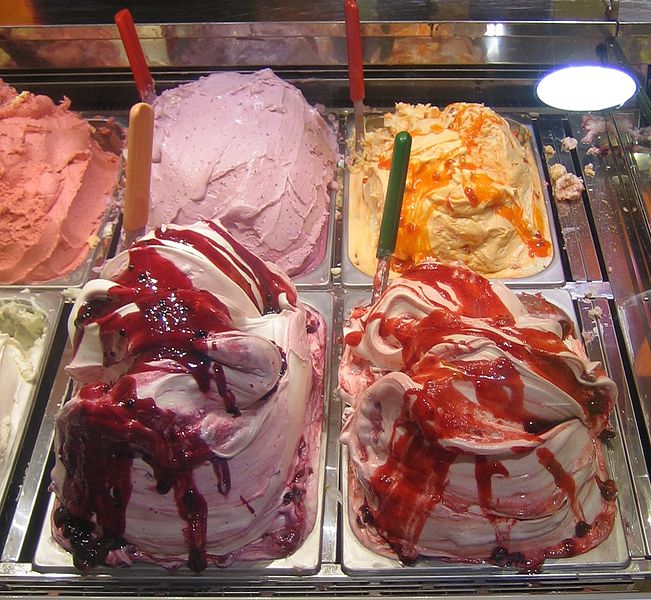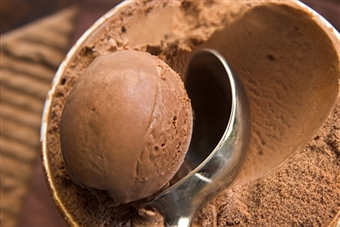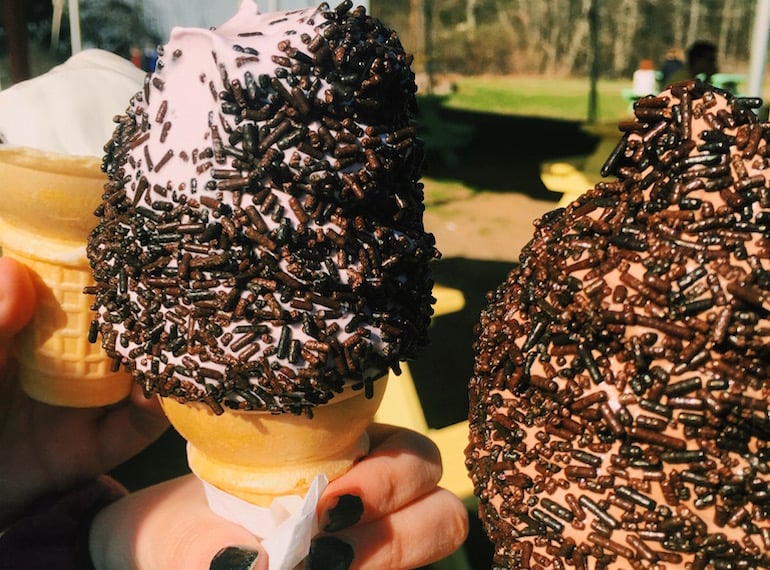Introduction

Ice cream is a beloved dessert enjoyed by millions around the world. Its creamy texture and delightful flavors make it a popular treat on hot summer days or as a sweet indulgence any time of the year. However, many people have experienced the peculiar phenomenon of feeling thirsty after indulging in a scoop or two of ice cream. This intriguing effect has puzzled both ice cream enthusiasts and scientists alike. In this article, we will unravel the mystery of why ice cream can make you feel thirsty and explore the scientific explanations behind this phenomenon.
Background Information On Ice Cream And Its Popularity
Ice cream is a frozen dessert that has been enjoyed for centuries. Its origins can be traced back to ancient China, Persia, and India, where frozen desserts were made from a mixture of snow or ice with flavorings. Over time, ice cream gained popularity and spread to different parts of the world. In the 17th century, it was introduced to Europe and became a favorite treat among the elite. In the 19th century, the invention of ice cream machines made it more accessible to the general public. Today, ice cream is a beloved dessert enjoyed by people of all ages and cultures, with countless flavors and variations to choose from. Its creamy texture, refreshing taste, and endless possibilities for customization have contributed to its enduring popularity.
Explanation Of The Phenomenon Of Feeling Thirsty After Eating Ice Cream
After consuming ice cream, some people may experience a sensation of thirst. This phenomenon can be attributed to several factors. Firstly, the cold temperatures of the ice cream can cause a temporary constriction of blood vessels, leading to a decrease in blood flow to the salivary glands. This reduction in saliva production can contribute to the feeling of thirst. Additionally, the high sugar and salt content in ice cream can cause a temporary imbalance in the body’s fluids, triggering a thirst response. These combined factors can explain why ice cream can make you feel thirsty.
The Science Behind Ice Cream Thirst

The science behind ice cream thirst lies in two main factors: cold temperatures and the high sugar and salt content of ice cream. The cold temperatures of ice cream constrict blood vessels, reducing blood flow to the salivary glands and decreasing saliva production, leading to a feeling of thirst. Additionally, the high sugar and salt content in ice cream can temporarily disrupt the body’s fluid balance, triggering a thirst response. These physiological reactions explain why ice cream can make you feel thirsty.
Impact Of Cold Temperatures On The Body’s Hydration Levels
When it comes to ice cream, the cold temperatures play a significant role in the feeling of thirst that follows. Cold temperatures cause blood vessels to constrict, reducing blood flow to the salivary glands and resulting in decreased saliva production. This decrease in saliva production can contribute to a sensation of thirst. Additionally, the cold temperature of the ice cream can lower the body’s overall temperature, which can lead to dehydration as the body works to maintain its internal temperature. Therefore, the impact of cold temperatures on the body’s hydration levels is a key factor in the ice cream thirst phenomenon.
Influence Of Sugar And Salt Content In Ice Cream On Thirst Sensation
The sugar and salt content in ice cream can also contribute to the sensation of thirst. Consuming sugary treats like ice cream can lead to an increase in blood sugar levels, which triggers the release of a certain hormone that signals thirst to the brain. Additionally, salt is known to increase thirst due to its ability to dehydrate the body. Ice cream with high sugar and salt content can therefore intensify the feeling of thirst. It is important to note that excessive consumption of sugary and salty foods should be moderated to maintain proper hydration levels.
The Role Of Fat In Ice Cream Thirst

The presence of fat in ice cream also plays a role in the sensation of thirst. High-fat content in ice cream affects the body’s response to the dessert. When fat is consumed, it slows down the rate at which the stomach empties, leading to a prolonged feeling of fullness and dehydration. Additionally, fat can affect the release of certain hormones related to thirst sensation in the body. Therefore, the fat content in ice cream can contribute to the feeling of thirst after consumption. It is important to be mindful of the fat content in ice cream and consume it in moderation to avoid excessive thirst.
How Fat Content Affects The Body’s Response To Ice Cream
The fat content in ice cream plays a crucial role in how the body responds to this frozen treat. When fat is consumed, it slows down the rate at which the stomach empties, leading to a prolonged feeling of fullness and dehydration. Furthermore, fat can impact the release of certain hormones related to thirst sensation in the body. Therefore, the fat content in ice cream can contribute to the feeling of thirst after consumption. It is important to be mindful of the fat content in ice cream and consume it in moderation to avoid excessive thirst.
Relationship Between Fat And The Feeling Of Dehydration
The fat content in ice cream has a direct impact on the body’s response and the feeling of dehydration. When fat is consumed, it slows down the emptying process of the stomach, resulting in a prolonged feeling of fullness. This delayed stomach emptying can give the sensation of dehydration, as the body may interpret the prolonged fullness as a need for more water. Additionally, fat can influence the release of certain hormones related to thirst sensation, further contributing to the feeling of thirst after consuming ice cream. Therefore, it is important to be mindful of the fat content in ice cream and consume it in moderation to avoid excessive thirst.
Cooling Effect And Thirst Perception

The cooling effect of ice cream on the mouth and throat can influence our perception of thirst. When we consume ice cream, the cold temperature stimulates the sensory receptors in our mouth and throat, triggering a refreshing sensation. This sensory input can create a perception of thirst, as our brain interprets the cooling effect as a need for hydration. Additionally, the sensation of coldness can also constrict blood vessels in the mouth and throat, further contributing to the feeling of dryness and thirst. Therefore, the cooling effect of ice cream plays a role in our perception of thirst after consumption.
The Connection Between The Cooling Sensation Of Ice Cream And Thirst
When it comes to the connection between the cooling sensation of ice cream and thirst, the answer lies in our sensory perception. The cold temperature of ice cream stimulates the sensory receptors in our mouth and throat, creating a refreshing sensation. This sensory input can be interpreted by our brain as a need for hydration, leading to a perception of thirst. Additionally, the constriction of blood vessels in the mouth and throat caused by the coldness of the ice cream can contribute to the feeling of dryness and thirst. So, while ice cream may initially cool us down, it can also make us feel thirsty.
Exploration Of The Body’s Sensory Responses To Temperature Changes
The body’s sensory responses play a crucial role in how we perceive temperature changes. When we consume ice cream, the cold temperature stimulates the sensory receptors in our mouth and throat. These receptors send signals to our brain, which interprets the sensation as cooling and refreshing. However, this sensory input can also be interpreted as a need for hydration, leading to a perception of thirst. Additionally, the constriction of blood vessels caused by the coldness of the ice cream can contribute to the feeling of dryness and thirst. Overall, our sensory system plays a key role in our experience of both the cooling sensation and the subsequent feeling of thirst after eating ice cream.
Psychological Factors And Ice Cream Thirst

The psychological factors also play a role in the sensation of thirst after consuming ice cream. Our minds are conditioned to associate certain foods, like ice cream, with specific behaviors and sensations. When we eat ice cream, our brain creates an expectation of satisfaction and refreshment. However, ice cream does not fully satisfy our thirst, leading to a psychological perception of thirst even though our bodily hydration needs may be met. This conditioned association between ice cream and thirst can influence our perception and intensify the feeling of needing to quench our thirst.
The Psychological Influence On Thirst Perception After Consuming Ice Cream
After consuming ice cream, our psychological factors can also influence our perception of thirst. Our minds are conditioned to associate certain foods, like ice cream, with specific behaviors and sensations. When we eat ice cream, our brain creates an expectation of satisfaction and refreshment. However, ice cream does not fully satisfy our thirst, leading to a psychological perception of thirst even though our bodily hydration needs may be met. This conditioned association between ice cream and thirst can intensify the feeling of needing to quench our thirst. Additionally, cognitive factors such as the expectation of feeling thirsty after eating ice cream can further contribute to this psychological influence.
Cognitive And Conditioned Associations Between Ice Cream And Thirst
There are cognitive and conditioned associations between ice cream and thirst that contribute to the phenomenon of feeling thirsty after consuming ice cream. Our minds are conditioned to associate certain foods, like ice cream, with specific behaviors and sensations. When we eat ice cream, our brain creates an expectation of satisfaction and refreshment. However, ice cream does not fully satisfy our thirst, leading to a psychological perception of thirst even though our bodily hydration needs may be met. This conditioned association between ice cream and thirst intensifies the feeling of needing to quench our thirst.
Conclusion

In conclusion, the phenomenon of feeling thirsty after consuming ice cream can be attributed to a combination of factors. The cold temperatures of ice cream can lead to a perception of dehydration, while the sugar and salt content can further intensify the sensation of thirst. Additionally, the fat content in ice cream may affect the body’s response and increase the feeling of dehydration. Psychological factors, such as cognitive associations between ice cream and thirst, can also contribute to this phenomenon. To minimize the feeling of thirst, it is recommended to drink water alongside enjoying ice cream. By understanding the science and psychology behind ice cream thirst, we can better quench our thirst while indulging in this sweet treat.
Summary Of Key Findings On Ice Cream Thirst Phenomenon
The phenomenon of feeling thirsty after consuming ice cream can be attributed to a combination of factors. The cold temperatures of ice cream can lead to a perception of dehydration, while the sugar and salt content can further intensify the sensation of thirst. The fat content in ice cream may affect the body’s response and increase the feeling of dehydration. Psychological factors, such as cognitive associations between ice cream and thirst, can also contribute to this phenomenon. To minimize the feeling of thirst, it is recommended to drink water alongside enjoying ice cream. By understanding the science and psychology behind ice cream thirst, we can better quench our thirst while indulging in this sweet treat.
Suggestions For Minimizing The Feeling Of Thirst After Eating Ice Cream
To minimize the feeling of thirst after indulging in ice cream, there are a few strategies you can try:
- Stay hydrated: Drink water before and after eating ice cream to maintain your body’s hydration levels.
- Choose low-sugar options: Opt for ice creams with lower sugar content to reduce the intensity of thirst-inducing effects.
- Balance flavors: Pair your ice cream with fruits or toppings that have high water content, such as watermelon or strawberries, to counteract the dehydration sensation.
- Eat smaller portions: Limit your ice cream intake to smaller servings to prevent excessive thirst.
- Enjoy in moderation: Remember to savor your ice cream in moderation to avoid overwhelming your body’s thirst response.
By following these suggestions, you can better enjoy your ice cream treat without feeling excessively thirsty afterwards.
Frequently Asked Questions About Why Ice Cream Makes You Thirsty
Q: Why does eating ice cream make me thirsty?
A: Ice cream is a delicious frozen treat loved by many, but it’s no secret that it can leave you feeling unexpectedly thirsty. This sensation has to do with how ice cream affects your body’s natural processes.
Q: How does ice cream affect the body’s thirst mechanism?
A: When you consume ice cream, its low temperature acts as a numbing agent on your taste buds, temporarily dulling your sense of taste. As a result, your body’s natural response is to produce more saliva, which helps to compensate for the numbness and maintain moisture in the mouth.
Q: Is the cold temperature of ice cream a factor in feeling thirsty?
A: Yes, the cold temperature of ice cream can also contribute to feeling thirsty. When you eat something cold, such as ice cream, your body reacts by constricting blood vessels in your mouth and throat to prevent heat loss. This vasoconstriction reduces the production of saliva, leading to the perception of dryness and increased thirst.
Q: Does sugar content in ice cream play a role in feeling thirsty?
A: Yes, the sugar content in ice cream can contribute to feeling thirsty. Sugary foods and beverages can cause an increase in blood sugar levels, leading to a process in your body called osmotic diuresis. This process triggers your kidneys to produce more urine, leading to dehydration and making you feel thirsty.
Q: Are there any other factors that may cause thirst after consuming ice cream?
A: Besides the temperature and sugar content of ice cream, other factors like salt content, artificial sweeteners, and flavorings can sometimes make you feel thirstier. Additionally, the sheer act of eating can also trigger a thirst response, as mastication (chewing) increases blood flow to the mouth and can temporarily decrease saliva production.
Q: How can I quench my thirst after eating ice cream?
A: To quench your thirst after enjoying ice cream, it is recommended to drink a glass of water or another hydrating beverage. Water helps replenish the fluid lost through osmotic diuresis caused by the sugar content of the ice cream. Alternatively, you can also enjoy a juicy fruit or consume foods with high water content to rehydrate.
Q: Does ice cream have any hydrating properties?
A: While ice cream does contain a certain amount of water, its dehydrating effects generally outweigh its hydrating properties due to the factors discussed earlier. To stay properly hydrated, it is best to rely on beverages specifically designed to replenish fluids, such as water or electrolyte-rich drinks.
Remember, feeling thirsty after eating ice cream is a normal and temporary sensation. It is a result of the interplay between the cold temperature, sugar content, and other factors present in ice cream. By drinking adequate fluids and maintaining a balanced diet, you can keep yourself well-hydrated while still enjoying your favorite frozen treats.

Soo Good Snack Bar is an upscale snack shop located at 1309 Hermosa Ave. in Hermosa Beach, CA. This family-owned business is the newest addition to the community of Hermosa, and our goal is to create a fun and inviting place where families can enjoy delicious snack foods that fit the beach lifestyle. Check us out today and help yourself to happiness.
